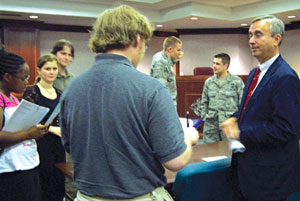County's Teen Court is continuing mission of peer-directed justice
By Phyllis Moore
Published in News on July 30, 2008 1:36 PM
Teen Court — introduced in Wayne County nearly nine years ago as an alternative to youths having a criminal record — has had another successful year, in student numbers as well as funding.
“We have seen marked increases in the number of volunteers working with the program and the volunteer hours,” said Sudie Davis, director of Communities in Schools, which oversees the program. Over the past year, 109 teens have served as jury members, attorneys, clerks or bailiffs in the year-round program. The only adults included are local attorneys who serve as judges.

Photo submitted
Youths volunteering in the Teen Court program gather around Wayne County District Attorney Branny Vickory, right, during a recent training at the courthouse.
The number of defendants served by Teen Court is also on the rise, Mrs. Davis said, but whether that is because there are more infractions or increased awareness of the program is uncertain.
“The purpose of Teen Court is to allow the child to complete it so that the charges against them are dismissed,” she said. “We do work collaboratively with district courts, the DA’s office, Clerk of Court’s office, Sheriff’s Office, police department and possibly 20 to 25 different places where kids do their community service.”
During the 2007-08 fiscal year, Mrs. Davis noted, youth defendants completed 1,463 hours of community service.
Teen Court has been fortunate to receive adequate funding, she added, something many agencies and programs have struggled with in recent years.
In addition to grants and Juvenile Crime Prevention Council support, United Way came through this year,
allowing the program to hire two people at its helm.
“We’re very pleased,” Mrs. Davis said. “This is a program where the grant was written to serve 78 kids and this year we served 135. ... Some nights we have two Teen Courts running.”
Tracy Andrews was hired as Teen Court coordinator and Sierra Beaton as volunteer coordinator. Both said they would have liked to have had a similar program when they were younger.
“I wish I could have been involved as a teen volunteer,” Mrs. Beaton said. “(They) really take it to heart and feel like they make a difference, for themselves, for their peers and for the community.”
Ms. Andrews worked briefly as a corrections officer in Raleigh before joining Teen Court at the end of March.
“It’s a wonderful program,” she said. “I think it really makes a difference in these kids’ lives who come in here.”
Parents, too, have appreciated the fact that it’s not simply a punitive program, Mrs. Davis said, but rather one that steers youth in a better direction.
“North Carolina is one of just two or three states where kids 16, 17 go to adult court, and I think Teen Court has been such an asset for those young people,” she said. “It used to be that they would have gone right into district court and it would have been decided, but this way they have a chance to give back to the community.”
“And what better way than peers on peers?” Ms. Andrews said.
As the program grows, so are some of the opportunities for volunteers to gain “on-the-job training,” Mrs. Beaton said. One example of that came in the form of the latest attorney training, held recently at the county courthouse.
The evening session provided students with ways to refine their skills and learn about such aspects of courtroom behavior as making opening and closing statements and being able to think quickly on their feet, she said.
“We’re also trying to develop a program where we have those attorneys and judges come back and mentor teens,” Mrs. Davis said.
The experience proves advantageous to some of the teens, who might be considering a career in criminal justice.
But even if that’s not the ultimate goal, Mrs. Davis said, the greatest success is found in efforts to provide better direction for the next generation. Some now working to help others had formerly been represented at the defense table, she noted.
“About half a dozen volunteers at any given time were once defendants,” Mrs. Beaton said, pointing out they later returned to serve as volunteers.
